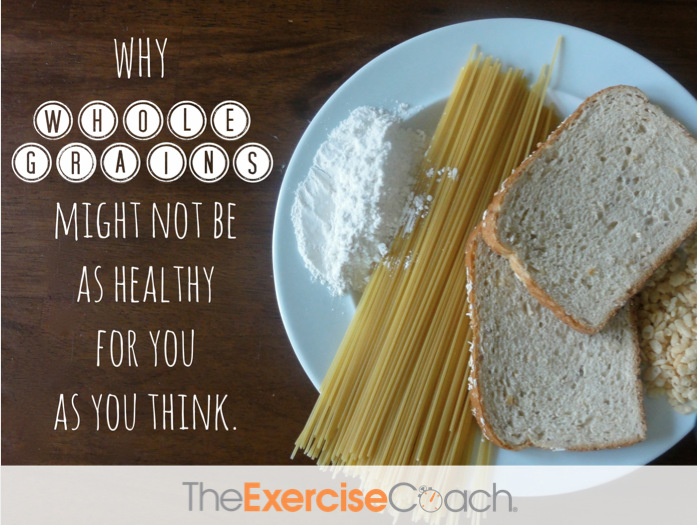
WHY “WHOLE GRAINS” MAY NOT BE AS HEALTHY FOR YOU AS YOU THINK, PART 6: GLUTEN

The grain series is coming to and end! Thanks to everyone who has taken the time to read each post and hopefully, benefit from the lessons taught.
If you are just joining us, check out our introductory post Why Whole Grains May Not Be As Healthy For You As You Think, then also Part 2: It’s As Simple As Sugar, Part 3: Understanding the Glycemic Load, Part 4: The Anti nutrients in Whole Grains, and Part 5: Lectins
This final post in the series will deal with a word we have all become familiar with, yet probably know very little about. GLUTEN! I personally have been gluten free for over 4 years and certainly know the benefits first hand! Yet, it is not only people, like me, who suffer from digestive issues such as leaky gut, inflammation, food sensitivities, etc. who can benefit. ALL can benefit.
Are you a woman who has had a very hard time losing weight even though you eat “very little?” Are you a man or woman with excess belly fat? Do you suffer from lack of energy, sore muscles, lack of motivation, lack of mental clarity? Do you have food allergies or digestive irregularities (diarrhea, constipation, gas, bloating, indigestion, reflux)? If yes to any of these, trying a Gluten Free diet may be your answer.
Whether you realize it or not, gluten is a staple of the American diet. Gluten is a protein found in wheat, barley, spelt, kamut. And, it is generally found in oats due to processing procedures. Translated….it is in pizza, pasta, sandwiches, wraps, rolls, cereal, and the majority of all processed foods, dinners in a bag, and most fast foods. In addition, you will find gluten in most commercial salad dressings, soups, baked goods, soy sauce, candy, snack foods, etc. Yep – pretty much everything most people eat.
What many people do not know is that Gluten can cause serious health problems – even for those without full-blown celiac disease (severe gluten allergy). I found his out the hard way years ago when my own digestive issues became serious digestive issues and landed me in the emergency room with more pain than I had during child birth! Not kidding.
Dr. Mark Hyman recently wrote a blog post indicating that The Journal of The American Medical Association found that people with diagnosed, undiagnosed, or latent celiac disease or gluten sensitivity had a higher risk of death, mostly from heart disease or cancer. 30,000 people who died were looked at from the years 1969 to 2008. Those with Celiac had a 39% higher chance of death, those with inflammation in the gut due to gluten – 79% higher (wow!), and 35% increased risk for those with gluten sensitivity but no celiac. So you don’t have to have Celiac to have serious health problems caused by Gluten!
Most people who have gluten-related illness are misdiagnosed. They are diagnosed with something else and are thus typically taking medications, which in reality make their gut issues even worse over time. Celiac disease itself (serious allergy to gluten) occurs in about 1 of every 100. Milder forms of gluten sensitivity are very common and may affect up to one-third of the American population.
In Dr. Hyman’s blog post, he shares that there are currently 55 diseases that can be caused by eating gluten. These include: Osteoporosis, Irritable Bowel Disease (IBS), Inflammatory Bowel, Anemia, Cancer, Fatigue, Canker sores, Rheumatoid Arthritis, Lupus, M.S., and all other autoimmune diseases. Gluten is also linked to many psychiatric and neurological diseases including anxiety, depression, schizophrenia, dementia, migraines, epilepsy, nerve damage, and autism. * While all cases of these illnesses may NOT be related to gluten, it is important to explore that possibility.
The very best way to see how you are affected by gluten is to eliminate it for 30 days and see how you feel. For the best results, keep a journal and write down each day’s symptoms or lack of them. Then, add gluten back in and again, journal how you feel over a period of a few weeks. Remember, to do this you cannot have a single “morsel” of gluten in any form! Many people will immediately notice the reduction in abdominal bloat. Many may feel more energy within a short period of time. Many will lose some weight!
I truly hope you take the “no grain” challenge (gluten and/or gluten free for that matter) for 30 days and see how you feel. I encourage you to adopt a grain-free or at least reduced-grain lifestyle so that you can experience the joy of a longer, healthier life!
*Read the complete article by Dr. Mark Hyman here: Gluten: What You Don’t Know Might Kill You
I also highly recommend the books Wheat Belly and Grain Brain
Read the rest of this series:
Why “Whole” Grains May Not Be As Healthy For You As You Think: Series Introduction
Part 2: It’s As Simple As Sugar
Part 3: Understanding the Glycemic Load